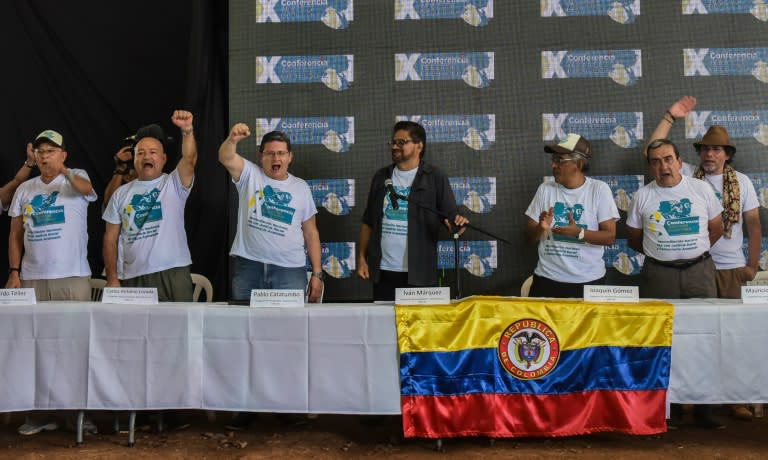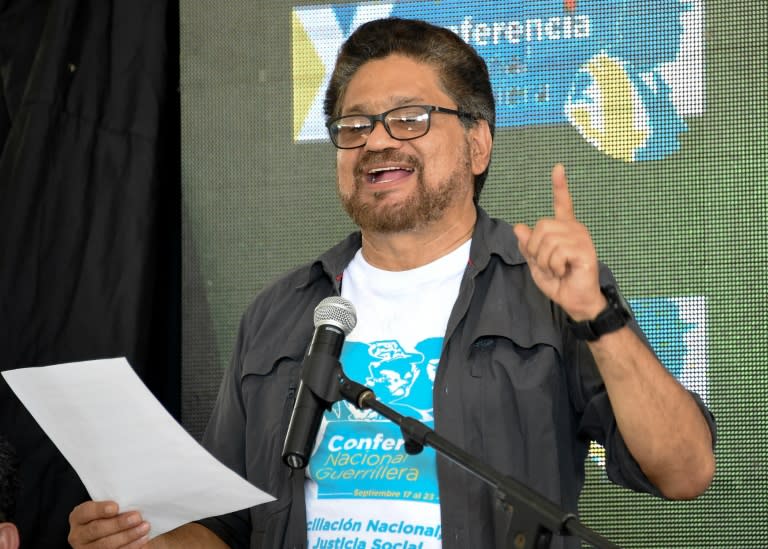FARC ratifies Colombia peace deal, declares war over
The Revolutionary Armed Forces of Colombia declared the end of its 52-year war Friday as it ratified a historic peace deal with the government. To a burst of applause and cheers, the FARC's chief peace negotiator announced the guerrillas had unanimously backed the agreement at a national conference. "The war is over," said Ivan Marquez, flanked by top FARC commanders, all dressed in civilian clothes and sitting at an impromptu conference table draped with Colombia's yellow, blue and red flag. "The guerrillas... have given their unanimous backing to the final accord," he said, on the sixth and last day of the meeting in El Diamante, a remote and sweltering site deep in the rebels' traditional stronghold in southeastern Colombia. If all goes according to plan, it will be the FARC's last meeting as a guerrilla army. Under the deal, the group is now to relaunch as a political party. Marquez, who led the FARC delegation at nearly four years of peace talks in Cuba, added a reference to one of Colombia's most famous sons, the Nobel prize-winning writer Gabriel Garcia Marquez. "Tell Mauricio Babilonia he can release the yellow butterflies," he said, an allusion to a character in the master of magical realism's "One Hundred Years of Solitude" who is so love-struck that a cloud of yellow butterflies follows him wherever he goes. President Juan Manuel Santos and FARC leader Rodrigo Londono -- better known by his nom de guerre, Timoleon "Timochenko" Jimenez -- will now sign the accord Monday in the Caribbean coast city of Cartagena. Colombians will then vote on it in a referendum on October 2. Recent polls show the "Yes" camp ahead. - New world of politics - The FARC, a Marxist guerrilla group, launched its war on the Colombian government in 1964, in the aftermath of a brutally repressed peasant uprising. Such guerrilla armies were common across Latin America in the latter half of the 20th century. But now, 25 years after the Cold War, Colombia's is the last major armed conflict in the Americas. Over the decades, it has drawn in several leftist rebel groups, right-wing paramilitaries and drug gangs, killing 260,000 people, leaving 45,000 missing and forcing 6.9 million to flee their homes. The FARC today has an estimated 7,500 fighters. Some 350 commanders and delegates representing the group's rank and file were present at the conference. The FARC is now expected to announce details on its new life as a political party, including a new name. "We're going to come out into the world of open politics. The main challenge will be achieving a political platform that brings together the diverse segments of Colombian society," FARC commander Carlos Antonio Lozada told AFP. Timochenko is expected to keep his role as leader of whatever organization emerges to replace the FARC. - Hawks to doves - The rebels came to the negotiating table after being weakened by a major army offensive led by then-defense minister Santos, who served in the post from 2006 to 2009 before becoming president. After an army raid killed the previous FARC leader, Alfonso Cano, in 2011, Timochenko, his successor, wrote to Santos proposing fresh peace talks -- the fourth such effort. They opened in Cuba in November 2012. Working through a six-point agenda one item at a time, delegates concluded a final, 297-page accord on August 24. The deal covers justice and reparations for victims of the conflict; land reform; the FARC's relaunch as a political party; disarmament; fighting the drug trafficking that has fueled violence in the world's largest cocaine-producing country; and implementing and monitoring the accord. It also grants an amnesty for "political crimes" committed during the conflict, although not the worst atrocities such as massacres, torture and rape. Those responsible for such crimes will face up to 20 years in prison, with lighter sentences if they confess. FARC fighters have vowed to now leave their mountain and jungle hideouts and hand in their weapons in a UN-supervised process. The government's efforts to open peace talks with a smaller guerrilla group, the National Liberation Army (ELN), have not yet borne fruit.



